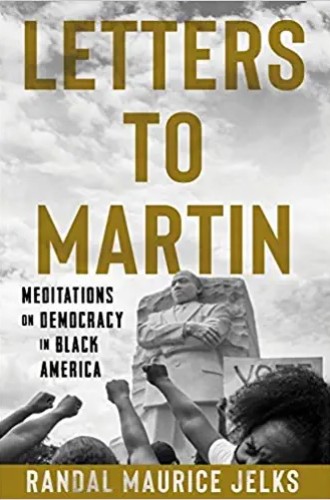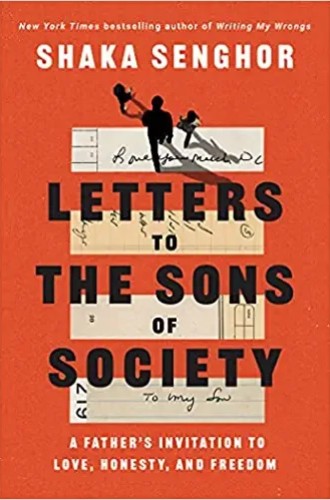Epistles of hope for our time
Randal Jelks and Shaka Senghor both write with realism but not fatalism.
When I served in congregational ministry and individuals found themselves in conflict, I often suggested letter writing as a tool. Memorializing one’s thoughts with ink on paper suggests a sense of permanence that warrants considered reflection on tone, structure, and content. When the letter is delivered, its reader can choose how and when to consume the information it contains. These qualities also make letter writing an interesting literary device—one that Randal Jelks and Shaka Senghor skillfully employ in their new books.
In Letters to Martin, Jelks, an accomplished scholar of Black American life, writes letters of social lament, diagnosis, and prescription to Martin Luther King Jr. The book may best be described as an intellectual history that connects the thought of the past—and especially the work of Black intellectuals—to the present. Jelks seeks to protect King’s legacy against both abstraction and sensationalism by creatively humanizing the civil rights leader’s context while also addressing his flaws. He also challenges current problematic and misguided appropriations of King’s words, ideas, and legacy.
I confess to initially struggling with this book because I felt like an interloper in the conversation it created. As a millennial White pastor, was I part of the intended audience, or was I an unwelcome eavesdropper?
Then it dawned on me. My hesitation echoed the caution of the White moderate pastors decried by King in “Letter from Birmingham Jail.” King wrote from his cell, “Perhaps I expected too much. I suppose I should have realized that few members of the oppressor race can understand the deep groans and passionate yearnings of the oppressed race, and still fewer have the vision to see that injustice must be rooted out by strong, persistent and determined action.” Just as King exhorted Americans to engage in strong, persistent, and determined action to realize the promise of civil rights, so Jelks calls for a renewed engagement to bolster democracy. That such a defense is necessary says a lot about our times.
Jelks names something important that often goes unnoticed. Those sounding the alarm over rising authoritarianism and democratic backsliding in the United States often recommend electoral or legal solutions. In this line of reasoning, democracy’s opponents need to be defeated at the ballot boxes and in the courts. While that is necessary, it is far from sufficient. It leaves the larger issue unaddressed: the rising support for illiberalism. Left unchecked, this will eventually overwhelm democracy.
For Jelks, defending democracy is a spiritual struggle. It involves soul work, both in the sense of sustaining ourselves to face very real challenges and in speaking to the souls of others to convert them (back) to democracy’s cause. This is one of the places where Jelks sees commonalities between the work of the present and King’s efforts in the past. He writes to King:
We need to find perspective even in restive times. Our times are uncertain, perhaps as uncertain as yours. This is why we need reflection. We need to slow down our responses and elongate our breath. Historically, meditations are meant to be regenerative. They are meant to bridge turbulent waters. To that end, these words are meant to be politically encouraging so that we can negotiate our way to a peaceable society.
Letters to Martin does this well. It creates space for anxious readers to reflect on the existential threats facing our nation and provides tools for reshaping how we think about them. Jelks’s words might inspire readers to compose letters to family, friends, and congregations that situate our present moment, remind us of our shared values, and carefully point out the many ways we have strayed from them.
I approached Senghor’s letter-writing project with a sense of familiarity. As the coauthor of an epistolary book about progressive Christian fatherhood, I know the vulnerability of publicly sharing personal letters written to a child. Still, this similarity of form did not adequately prepare me to read Letters to the Sons of Society.
The book’s opening epistle seized me. Senghor describes the pain of rejection he felt as an incarcerated father whose young son didn’t know him and then recounts his rage at a threat that same son made to him many years later. The narrative shifts with the news of the son’s murder at a gas station, only to end with the realization that there was a case of mistaken identity and his son is alive. As a reader, I have never experienced so many complex emotions in so few pages.
Readers may be tempted to stereotype this book. Indeed, it covers a lot of the ground one would expect from a formerly incarcerated Black man writing in 2022. But Senghor navigates that terrain in surprising ways.
Consider his encounter with a White police officer outside a barbershop on a Cincinnati street corner. He sets up the story in a way that primes readers to expect confrontation. Someone wrongly perceives Senghor’s group, which is part of a Smithsonian traveling exhibit, as a threat and calls the police. They see an officer approaching them from down the street and growing visibly angry.
But when the officer arrives, he expresses his frustration at being forced to respond to such a “dumbass call.” He understands how his presence reflects the problem of over-policing rooted in social control of minority populations. Sensing an ally, Senghor invites the officer inside the barbershop to meet the rest of the group, which includes NFL legend Jerome Bettis. The officer holds back, naming the truth that “if I walk in, your party goes flat.”
This constant element of surprise, along with the authenticity of Senghor’s perspective and the incisiveness of his writing, makes this book well worth reading. Senghor quickly and thoroughly undermines the assumptions readers bring, while exercising a surprising gentleness toward his audience as he addresses some of the hardest truths about our society that he has lived firsthand.
Hope is the thread that unites these two volumes. This hope is unexpected, given the threats Jelks perceives and the experiences Senghor has endured. Both are brutally honest about present realities yet convinced that the future can be different from today. Both write with a realism that manages to avoid the pitfalls of fatalism—an impressive accomplishment.
Perhaps the authors’ adoption of the letter-writing genre makes their hopeful realism easier to achieve. Senghor writes at the beginning of his book:
I believe that letters are one of the most intimate forms of communication. They give us an insight into the most frightening, uncertain places and can serve as an introduction to what it means to be passionate, to love, to dream, to settle differences. . . . Across the centuries, letters have served to challenge ideas, create movements, highlight contradictions, and inspire love.
In their own ways, both Jelks and Senghor build on that tradition. They allow us to glimpse their thinking and experience some of their pain. They compel Christians to consider uncomfortable questions about the role the institutional church and its members play in perpetuating the social sins named in their pages.
Still, their agenda is clearly more to inspire than to condemn. They believe what’s wrong with the world can be made right. These are books that seek redemption.






